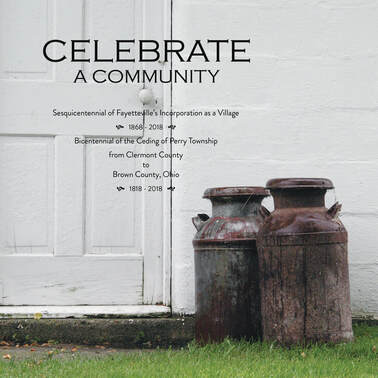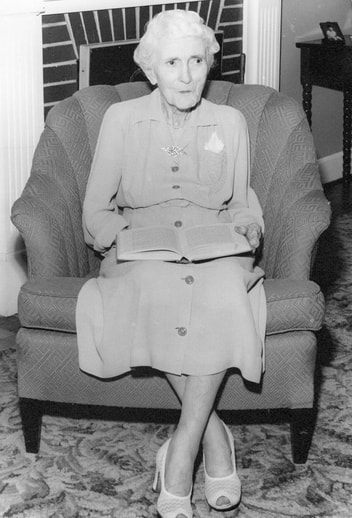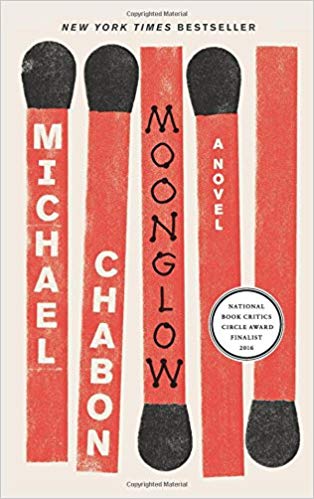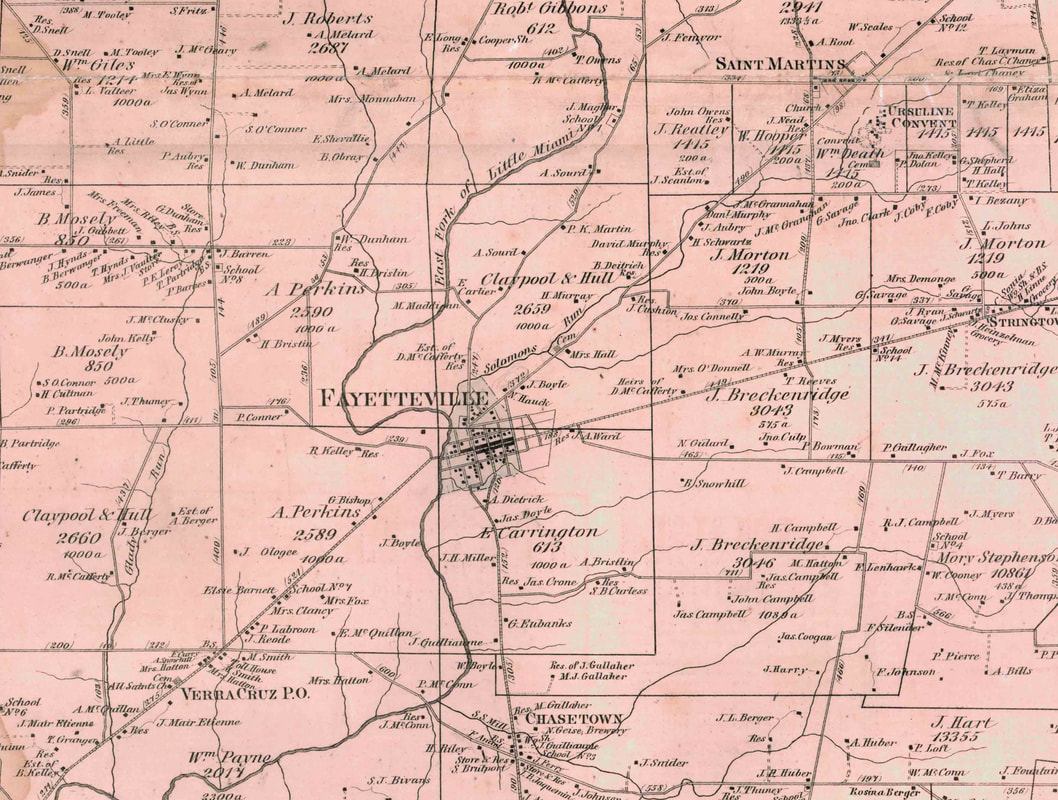 The family milkhouse is pictured on the cover of this handsome book filled with historic photos and documents. The family milkhouse is pictured on the cover of this handsome book filled with historic photos and documents. Peggy Cooper, of northern Kentucky, introduces Clearing the Fog readers to Celebrate A Community, soon to be reprinted by Murky Press. More about this exciting project coming soon! The stars spread across the sky as they do only when you live on a dairy farm acres away from the nearest neighbor. The milking was finished and I walked with my father, hand in his, from the barn to the house. At the sidewalk to the milkhouse, he suddenly paused and sat on his heels, his scratchy bearded cheek against mine, one arm around me holding me close and the other pointing into the sky, guiding my gaze to the Big Dipper. It was there at the end of his finger, the Big Dipper, over the milkhouse. Who knew that there were pictures in the sky made of stars, and over our milkhouse? When I started this book project, my husband would tease me about “the Center of the Universe,” the little town I was writing about, Fayetteville, in Perry Township, Ohio. He was making fun of my attachment to this little one-stoplight crossroads. My father lived his entire life on the farm where that milkhouse stands beneath the Big Dipper. My brothers are farmers tilling the same land farmed by five generations of our family. That milkhouse is now on the cover of the book that is filled with photos and memories of the community around that milkhouse, and many of my father’s stories are within the covers of that book. Who knew that there were pictures in the sky made of stars, and over our milkhouse? Indeed, who knew that Fayetteville and Perry Township really are the Center of the Universe?
0 Comments
 My great-grandmother Atha (Mrs. R. H.) Marrs on August 14, 1955, at the age of 91. Mrs. Marrs appears in two Lawrenceburg scenes in the novel "Next Train Out." Photo provided by Bob McWilliams. My great-grandmother Atha (Mrs. R. H.) Marrs on August 14, 1955, at the age of 91. Mrs. Marrs appears in two Lawrenceburg scenes in the novel "Next Train Out." Photo provided by Bob McWilliams. For many, writing is a solitary pursuit. I prefer a host of collaborators. The novel I’ve been working on for a number of years would never have been completed without my “support team.” It started nearly 10 years ago when my then-neighbor, Chuck Camp, while chatting on my back patio, took an immediate interest in the story of my mysterious grandfather. Within hours he had begun to discover the path my grandfather had taken after abandoning my mother and grandmother. Over the next few years he continued to unearth amazing details about Lyons’ early life and his military service. I owe the story, in all its richness, to Chuck. I had never written fiction before, and I had a lot to learn. I depended on classes and instructors at Lexington’s Carnegie Center for Literacy & Learning for teaching me the nuts and bolts of the craft. I’m still an unabashed novice, but they helped me understand what was important to readers and how you put together a story that will keep them engaged. There were numerous times over the last three years when I felt I wasn’t up to the task. I started and restarted and reimagined how to construct this story. I tried a variety of different approaches. Even when I felt I had a solid half of the book complete, my determination waned. It was just too hard. Too time consuming. I had no idea what I was doing. That’s when my intrepid readers and editors stepped in to shore up my confidence. My long-time friend and former boss, Roi-Ann Bettez, was my first beta reader. She is an enthusiastic reader of all sorts of material and an acute editor who has applied her talents to her husband’s award-winning books about the First World War as well as to nonfiction books produced by her friends. She offered honest critique of what worked for her and what didn’t. She helped me focus on what the reader needed from the characters. And she let me know what parts of the story she found satisfying. She’s still working with me, offering encouragement and insights at the very end of this process. Readers of this blog know that Tim Cooper took on the role of nearly full-time mentor and coach after retiring from teaching in 2018. A voracious reader and former writing instructor, Tim and his Minnesota buddies are competitive readers who know more about contemporary literary fiction than anyone I know. He patiently coaxed me to go where I wasn’t comfortable. I was able to lean on his academic interest in history for creative ways to keep the novel firmly rooted in its times. Tim and I have spent hours in his living room poring over chapters and paragraphs and arguing about specific words. He pushed me. He encouraged me. He wouldn’t let me quit. My cousin Bob McWilliams loaned me his family scrapbook full of photos and newspaper clippings, which were invaluable in putting together the stories of our Marrs ancestors and their McWilliams contemporaries. Rogers Bardé, my cousin through my grandfather Lyons’ family, was the original impetus for seeking information about him. Her voluminous genealogical research into that branch of my family helped me understand my Paris, Ky., roots a little better. As I approach the final publication phase of the book, I am once again relying on the talents of Barbara Grinnell, whose cover design for The Last Resort perfectly captured the book, its author, and its historic period. I’ve pulled in yet another former colleague and expert editor, Jo Greenfield, as my final proofreader. I’m delighted to have her as part of this process. And I would be remiss if I didn’t acknowledge Mr. Vice President of Everything, my husband, Rick. He does battle with the print store managers, hobnobs with local authors, shares his creative marketing ideas, opens his wallet wide for the next class or the next production expense, and is an incredibly helpful commenter on the novel itself whenever I can convince him to sit quietly for an hour and read. This project would not be coming to fruition without the unselfish contributions of all of these folks. I offer them my heartfelt gratitude, and I hope the final product is worthy of their efforts. I’ll be satisfied if I learn that the novel offers a little entertainment, a little illumination into our human contradictions, and a little distraction from our contemporary afflictions.  Nearly two years ago a friend sent me a review of Michael Chabon’s 2016 novel Moonglow. In the book, Chabon pieces together the remarkable life of his crotchety grandfather, a World War II veteran and a rocket aficionado. One reviewer, Hamilton Cain, in O, The Oprah Magazine, calls it “an exuberant meld of fiction and family history.” I realized immediately that I needed to read this book. It’s an amazing story of family secrets only revealed when painkillers loosen the grandfather’s inhibitions—and his lips—during the last days of his life. There are phantasmagoric tales of mental illness, war crimes, civilian crimes, the space age, Jewish slums, and Florida retirement communities. And if you’re familiar with Chabon’s work, you know it’s brilliantly written. I highly recommend it. As I’ve worked on my own novel about a somewhat mysterious grandfather, I’ve frequently returned to the words Chabon wrote in his Author’s Note: “In preparing this memoir, I have stuck to facts except when facts refused to conform with memory, narrative purpose, or the truth as I prefer to understand it. Wherever liberties have been taken with names, dates, places, events, and conversations, or with the identities, motivations, and interrelationships of family members and historical personages, the reader is assured that they have been taken with due abandon.” One of my chief struggles has stemmed from my desire to reveal all that I have learned about my ancestors and about the times they lived in. I know this is not what the reader of a work of fiction wants. And I have worked assiduously to rein in those tendencies. I recognize that some of my best characters may be the ones I invented whole cloth because I didn’t have the details of their lives available to me. And, of course, all conversations, all motivations, all emotional reactions were fabricated. With no family letters or other personal artifacts, how could I know any of that? I sometimes remind myself that the imagination can be the best conduit for the truth. There’s a reason Chabon’s note ends with the words “due abandon.” However, I freely confess that the facts have largely dictated the broad strokes of the narrative. After all, I started out wanting to tell the story of my grandfather’s life. And there were some truly eye-popping discoveries that I hope have led to a compelling story line. But at times I allowed myself to get bogged down in details that a general audience will not care about. With help from my early readers, I have trimmed a good bit of that out. I know I still have a little more that needs to go. It always helps to reread Chabon’s words and remember how critical it is to stick with facts “except when facts [refuse] to conform with memory, narrative purpose, or the truth as I prefer to understand it.” It is, after all, a work of fiction--“Scout’s honor,” as Chabon defiantly states in the disclaimer for his memoir. |
Details
Archives
June 2023
Categories
All
|



 RSS Feed
RSS Feed